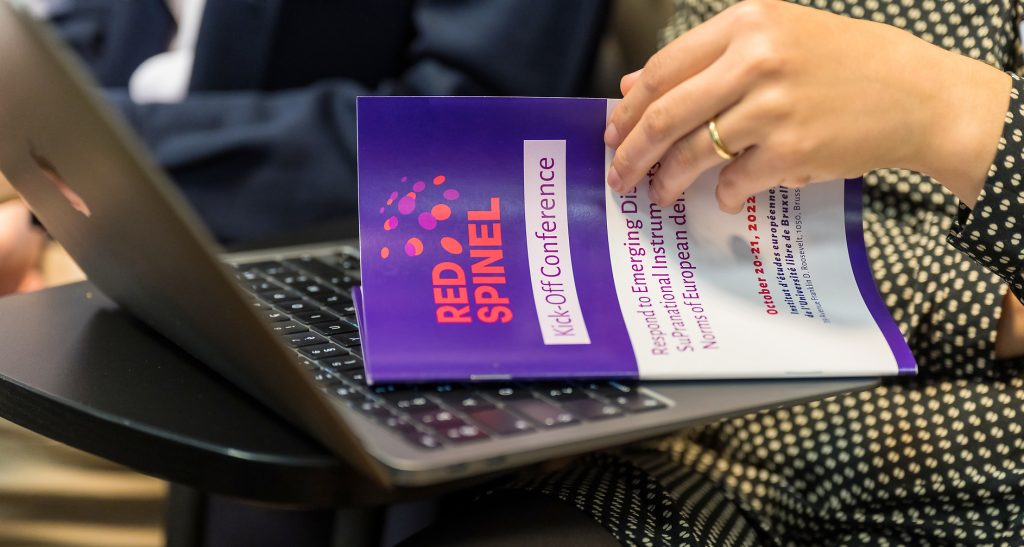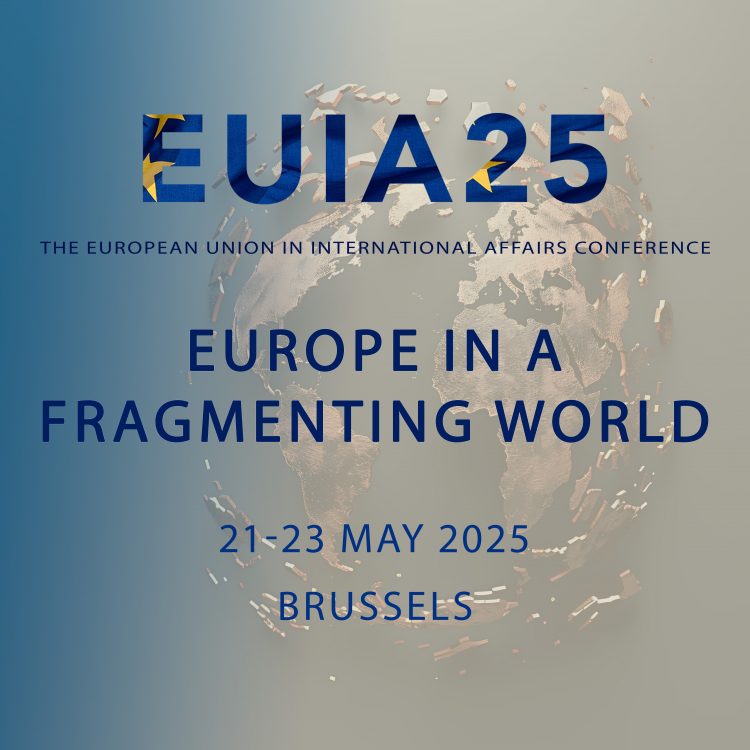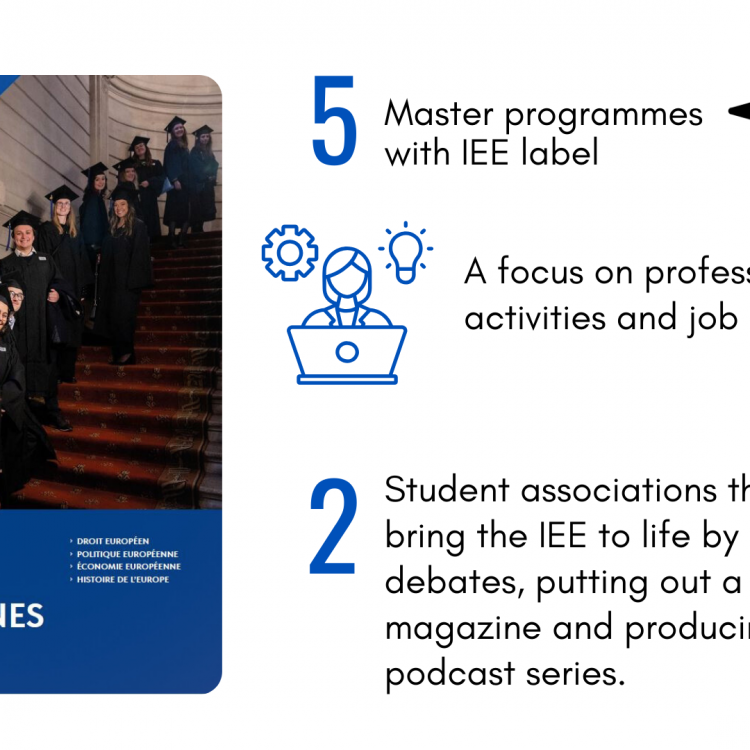Faculty/Departement : Institut d’études européennes (IEE)
Supervisor: Professor Amandine Crespy
Contract Type: International Post-doctoral Fellowship
Contract Length: 2 years (24 months)
Work Time: Full-Time
Start Date: September 2023
External Funding Source: RED-SPINEL (Horizon Europe-RIA n°101061621)
Remuneration: approx. 2600 €/month net (+ periodic indexation on inflation)
Job description
The selected candidate will be hired as a full-time Post-Doctoral Research Fellow in the framework of Horizon project RED-SPINEL (‘Respond to Emerging Dissensus: SuPranational Instruments and Norms of European democracy’)
The selected candidate will take on a research & management mandate on external (EU) funding.
As part of the research team based at the Institut d’études européennes (IEE), the hired post-doctoral fellow will contribute to the research capacities dedicated to the RED-SPINEL research project, specifically those associated with the project’s Work Package 5 entitled EU economic governance instruments and the rule of law, under the supervision of Prof. Arnaud Waeyenberge (HEC Paris). WP 5 involves the Haute Ecole de Commerce (HEC) in Paris, A. Waeyenberge), University LUISS Guido Carli in Rome (T. Christiansen, C. Fasone) and Université libre de Bruxelles (A. Crespy).
The scientific input provided by the fellow will deal in particular with the following research line within the WP: the rise of conditionality (in its various forms) as the key governance device in the recovery agenda.
The hired Post-Doctoral Fellow will contribute to the following missions:
- Conduct research aiming to achieve the milestones and deliverables of the work package (including data collection and drafting of papers to publishable standard)
- Disseminate scientific results at various events
- Help in the coordination and organisation of work (and events) in the framework of Red Spinel WP 5 in relation with partner universities/colleagues
The Project
RED-SPINEL is a 36-month long, 3.2 million euro, interdisciplinary, international and intersectoral project coordinated by the Institut d’études européennes of the ULB (PI Ramona Coman) involving seven higher education institutions: Université libre de Bruxelles, Libera Università Internazionale degli Studi Sociali Guido Carli, Universiteit van Amsterdam, Universitatea Babeș-Bolyai, HEC Paris, Uniwersytet Mikołaja Kopernika w Toruniu and the University of Warwick. They are joined in the consortium by four non-academic partners: Peace Action, Training and Research Institute in Romania, Milieu Consulting, Magyar Helsinki Bizottság / Hungarian Helsinki Committee and Stichting Nederlands Instituut voor Internationale Betrekkingen Clingendael across eight European countries.
The project will analyse the changing nature of dissensus surrounding liberal democracy and its implications for EU supranational policy instruments. It will unpack the inter-connected drivers of contemporary dissensus surrounding liberal democracy. The project will develop a range of scientifically informed policy recommendations and capacity-building efforts able to foster innovative democratic practices able to respond to the present-day dissensus.
Empirically, RED-SPINEL will focus on the key policy instruments and legal mechanisms shaping the EU’s efforts in support of democracy and the rule of law. The studied instruments include the EU rule of law toolbox, the neighbourhood and accession instruments, the European semester, fundamental rights, and judicial instruments, as well as citizen participation platforms. Furthermore, through a series of stakeholder events, RED-SPINEL will flesh out the implications of its findings for public policy stakeholders (i.e. legal professionals, policymakers, European youth) as well as EU instruments aimed at responding to said dissensus. The project’s concept-building effort will centre on the notion of ‘dissensus’ as it explores how contemporary dissensus surrounding liberal democracy differs from previous debates and which more fundamental questions it raises about future democratic practices and the rule of law. Ultimately, RED-SPINEL will provide a typology of said dissensus, map the principal actors of the dissensus in Europe and unpack its two underlying drivers – i.e., heightened internal contestation over liberal democracy and external competition from alternative illiberal models.
Coordinated by HEC, WP 5 on ‘EU Economic Governance Instruments and the Rule of Law’ will explore how, in response to the apparent ineffectiveness of the political protection of the rule of law and democratic procedures within the EU, the EU has launched a new strategy relying on a series of complementary instruments steeped in judicial and techno-managerial mechanisms rooted in European economic governance and the regulation of the EU’s Single Market. This partly involves the creation of dedicated mechanisms and partly the use of instruments developed in the context of the surveillance of national policies or the application of EU law.
Concomitantly, the instruments studied by WP5 have also increasingly integrated gender. As the European semester has explored gendered forms of budgeting it has become a further source of dissensus. Overall, WP5 will critically assess these new strategies and it will do this in collaboration with the relevant stakeholders involved in the European Semester, among first and foremost among which policymakers, experts, and the social partners at both the EU and Member State levels. The research will: (1) identifying the techno-managerial mechanisms mobilised; (2) analysing the consequences of this new approach for the protection of the rule of law and democracy within the EU; and (3) considering how the resulting executive arbitrage between the rule of law and the economic and fiscal objectives pursued by the Economic and Monetary Union have impacted the politicisation of EU governance.
Empirically, WP5 will focus on two aspects: 1) the use of economic instruments to achieve goals related to democracy and the rule of law within and outside of the EU, 2) the rise of conditionality (in its various forms) as the key governance device in the recovery agenda. Across both areas of investigation, dynamics of politicisation, and outcomes in terms of policy effectiveness and political legitimacy will be scrutinised. To this end, WP5 will: (1) identify the techno-managerial socio-economic governance mechanisms mobilised by the EU to equally monitor and promote liberal democratic principles, (2) analyse the consequences of a Single Market-driven approach to the protection of the Rule of Law and democracy within the EU, and (3) consider how the resulting executive arbitrage between the rule of law and the economic and fiscal objectives pursued by the Economic and Monetary Union have impacted the politicisation of EU governance (see Fig. 1.3.).
Work Environment and conditions
The Institut d’études européennes (IEE) at the Université libre de Bruxelles (ULB) is a Jean Monnet Centre of Excellence. As such, it is a recognised for its expertise in European Studies. The IEE-ULB carries out its own interdisciplinary research projects. At the same time, it promotes the work of its affiliated members on European issues within the associated research units and centres of its three partner faculties – the Faculty of Philosophy and Social Sciences, the Faculty of Law and Criminology and The Solvay Brussels School of Economics and Management. The IEE-ULB develops an interdisciplinary research agenda established by the Institute’s Research Committee. The current agenda is based on four research themes that are articulated around political sciences, law, economics, history, values and global interactions: Europe as an area of freedom, security & justice; Europe as an area of economic & social regulation; Europe as a community of norms & values; and Europe in the world.
The hired Post-doctoral Fellow will be a member of an IEE-based research and management team coordinated by Professor Ramona Coman and dedicated to the implementation, coordination, and promotion of RED-SPINEL.
Research will be coordinated in collaboration with Prof. Amandine Crespy in connection with the team of colleagues at LUISS.
Remuneration is approx. 2600 €/month net (+ periodic indexation on inflation).
Eligibility and profile
Qualifications required
Ph.D. in political science (or a directly related field such as international relations, sociology, EU studies…) ideally focused on themes relevant to RED SPINEL
Mobility Requirement
As the funding is provided as an international post-doctoral fellowship eligible candidates must be in a position to formally expatriate (i.e., move) to Belgium when starting the contract. This means that “the selected candidate must not have resided or carried out their main activity in Belgium for more than 12 months over the past 3 years immediately before their recruitment date”
Scientific knowledge and skills
Candidates must have
- Expertise and/or interest in the topic of the project
- A strong publication record
- Skills in qualitative and/or quantitative research methods
- Abilities to coordinate the organisation of scientific events (e.g., conferences, summer schools, workshops, panels international conferences …)
General knowledge and skills
Candidates must have
- Very good command of English (excellent academic writing and oral skills), French is an asset.
- Ability to work in a team, to meet deadlines and to combine autonomy with respect of guidelines
- Experience of working in an international environment
- Demonstrate their ability to evolve in a multi-cultural environment
Overview of the knowledge, skills, experience & qualifications required to effectively fulfil the role
|
REQUIREMENTS – The hire must demonstrate: |
ESSENTIAL (E) or DESIRABLE (D) requirements |
MEASURED BY: a) Application Form incl. CV. b) Interview c) Personal Presentation & Motivation |
|
A PhD in a relevant field (political science) |
E |
a, c |
|
Expertise in Democracy studies, EU/Global governance studies, Democracy promotion, Political Parties, Civil Society |
E |
a,b, c |
|
Delivery of research findings at seminars, workshops and conferences |
E |
a, b, c |
|
Ability to organise meetings and workshops |
E |
a, b |
|
Working knowledge of both English and French. Excellent academic writing skills in English are required and a good understanding (passive) of French |
E |
a, b |
Application procedure*
*Additional information can be received by contacting Prof. Amandine Crespy.
The successful candidate will be selected based on the quality of the CV, research achievements, motivation, and intellectual congruence with the project. Each candidate should explain clearly his/her interest in the project and how and why he/she can contribute to its development. Experience and achievements in academic research in areas relevant to the project will be taken into consideration at the time of selection.
Application Files
The application documents are to be consolidated into one single PDF file sent by email to Maureen Cossalter.
Application files must include in a single PDF document the following information in English:
- A separate detailed motivation letter (3 pages max.) explaining the candidate’s general research interest in the project and his/her potential contribution to it.
- A curriculum vitae listing all academic qualifications, relevant research experience and previous publications including the contact details of two referees
You may choose to complete a standard Europass form (https://europa.eu/europass/en) or not. This is left entirely up to the applicants. Once completed, whether Europass or not, the CV must be included in the single application file
- A copy of the passport/ID, PhD and master diploma
Application Calendar
- Applications are open until 15 April 2023
- Interviews with Prof. Amandine Crespy will be organised online on 18-19 April 2023.
Short-listed candidates will be informed on 19 April. During the interview, they will be asked to make a brief presentation outlining their prospective contribution to the project.
- The final decision will be taken as soon as possible after the interviews.
Equal opportunity policy
ULB’s personnel policy is based on diversity and equal opportunity.
We recruit candidates on the basis of their skills, regardless of their age, gender, sexual orientation, origin, nationality, beliefs, disability, etc.
Would you like to be provided with reasonable accommodation in the selection procedure because of a disability, disorder, or illness? Please contact Marie Botty, the person in charge of diversity aspects for the academic and scientific staff (marie.botty@ulb.be). Be assured of the confidentiality of this information.
More details on the ULB gender and diversity policy are available at https://www.ulb.be/en/about-ulb/gender-equality-at-ulb
Please also see the vacancy on
The Université libre de Bruxelles’s website




